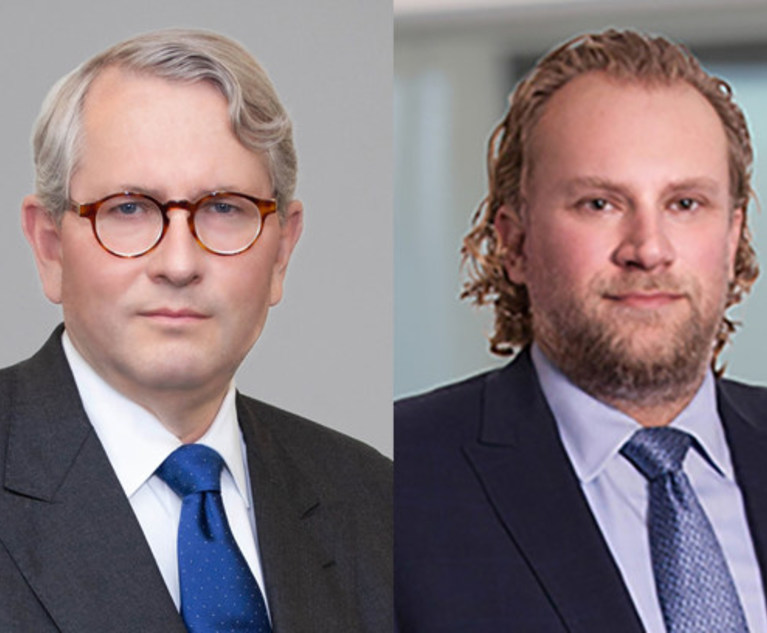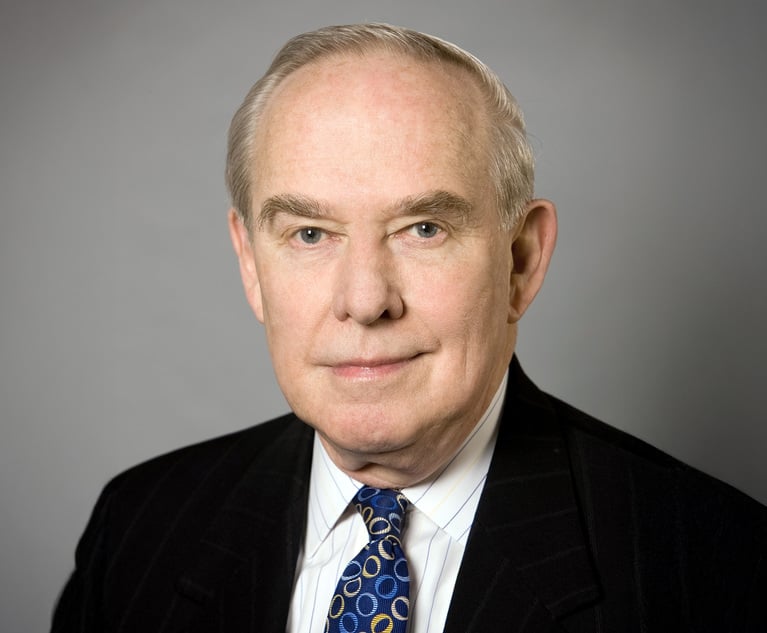 Carl W. Hittinger, left, and Julian Perlman, right, with Baker Hostetler. Courtesy photos
Carl W. Hittinger, left, and Julian Perlman, right, with Baker Hostetler. Courtesy photos Continued Antitrust Focus on the Labor Market in the Wake of 'NCAA v. Alston'
Almost a year old, Alston's repercussions continue to be felt, far outside of the confines of sports. Its holding has impact even in the world of criminal justice, and it will continue to be front and center with the renewed antitrust focus on labor markets.
April 22, 2022 at 12:50 PM
8 minute read
Almost one year has passed since the U.S. Supreme Court's unanimous antitrust decision in NCAA v. Alston. That well-publicized decision affirmed the district court's rejection of the NCAA's limits on education-related compensation paid to student athletes as well as the NCAA's implicit request for the court to create a judicial antitrust exemption for college athletics, much like the judicially crafted antitrust exemption for Major League Baseball, also the topic of much media coverage as of late.
As predicted, the repercussions of Alston continue to be felt in the sports world, particularly coupled with the NCAA's announcement of new rules regulating the ability of college athletes to profit from their name, image, and likeness (NIL). In the wake of Alston, minor league baseball clubs have sued challenging the antitrust exemption for baseball. And renewed federal legislation, now from Sen. Bernie Sanders, has been introduced potentially threatening that exemption. College athletes have brought claims under the FLSA in the Eastern District of Pennsylvania, challenging the "amateurism" rationale for refusing to compensate college athletes as employees. See Johnson v. NCAA, 556 F.Supp.3d 491 (2021). Athletes have alleged that NCAA eligibility is now a business or property interest under RICO law. See, e.g., Bowen v. Adidas America, 2021 WL 371131 (D.SC. 2021). And college athletes have sought compensation for exploitation of their NIL for which they were not permitted to be compensated under then-applicable NCAA rules, which prohibited any such remuneration absent some waiver from the NCAA. See House v. NCAA, 545 F.Supp.3d 804 (N.D.Cal. 2021).
This content has been archived. It is available through our partners, LexisNexis® and Bloomberg Law.
To view this content, please continue to their sites.
Not a Lexis Subscriber?
Subscribe Now
Not a Bloomberg Law Subscriber?
Subscribe Now
NOT FOR REPRINT
© 2025 ALM Global, LLC, All Rights Reserved. Request academic re-use from www.copyright.com. All other uses, submit a request to [email protected]. For more information visit Asset & Logo Licensing.
You Might Like
View All
What to Know About the New 'Overlapping Directorship' Antitrust Development
4 minute read
Bondi and Big Tech: What Trump's Choice for US AG Could Mean for Antitrust Enforcement
7 minute readLaw Firms Mentioned
Trending Stories
- 1Class Action Litigator Tapped to Lead Shook, Hardy & Bacon's Houston Office
- 2Arizona Supreme Court Presses Pause on KPMG's Bid to Deliver Legal Services
- 3Bill Would Consolidate Antitrust Enforcement Under DOJ
- 4Cornell Tech Expands Law, Technology and Entrepreneurship Masters of Law Program to Part Time Format
- 5Divided Eighth Circuit Sides With GE's Timely Removal of Indemnification Action to Federal Court
Who Got The Work
J. Brugh Lower of Gibbons has entered an appearance for industrial equipment supplier Devco Corporation in a pending trademark infringement lawsuit. The suit, accusing the defendant of selling knock-off Graco products, was filed Dec. 18 in New Jersey District Court by Rivkin Radler on behalf of Graco Inc. and Graco Minnesota. The case, assigned to U.S. District Judge Zahid N. Quraishi, is 3:24-cv-11294, Graco Inc. et al v. Devco Corporation.
Who Got The Work
Rebecca Maller-Stein and Kent A. Yalowitz of Arnold & Porter Kaye Scholer have entered their appearances for Hanaco Venture Capital and its executives, Lior Prosor and David Frankel, in a pending securities lawsuit. The action, filed on Dec. 24 in New York Southern District Court by Zell, Aron & Co. on behalf of Goldeneye Advisors, accuses the defendants of negligently and fraudulently managing the plaintiff's $1 million investment. The case, assigned to U.S. District Judge Vernon S. Broderick, is 1:24-cv-09918, Goldeneye Advisors, LLC v. Hanaco Venture Capital, Ltd. et al.
Who Got The Work
Attorneys from A&O Shearman has stepped in as defense counsel for Toronto-Dominion Bank and other defendants in a pending securities class action. The suit, filed Dec. 11 in New York Southern District Court by Bleichmar Fonti & Auld, accuses the defendants of concealing the bank's 'pervasive' deficiencies in regards to its compliance with the Bank Secrecy Act and the quality of its anti-money laundering controls. The case, assigned to U.S. District Judge Arun Subramanian, is 1:24-cv-09445, Gonzalez v. The Toronto-Dominion Bank et al.
Who Got The Work
Crown Castle International, a Pennsylvania company providing shared communications infrastructure, has turned to Luke D. Wolf of Gordon Rees Scully Mansukhani to fend off a pending breach-of-contract lawsuit. The court action, filed Nov. 25 in Michigan Eastern District Court by Hooper Hathaway PC on behalf of The Town Residences LLC, accuses Crown Castle of failing to transfer approximately $30,000 in utility payments from T-Mobile in breach of a roof-top lease and assignment agreement. The case, assigned to U.S. District Judge Susan K. Declercq, is 2:24-cv-13131, The Town Residences LLC v. T-Mobile US, Inc. et al.
Who Got The Work
Wilfred P. Coronato and Daniel M. Schwartz of McCarter & English have stepped in as defense counsel to Electrolux Home Products Inc. in a pending product liability lawsuit. The court action, filed Nov. 26 in New York Eastern District Court by Poulos Lopiccolo PC and Nagel Rice LLP on behalf of David Stern, alleges that the defendant's refrigerators’ drawers and shelving repeatedly break and fall apart within months after purchase. The case, assigned to U.S. District Judge Joan M. Azrack, is 2:24-cv-08204, Stern v. Electrolux Home Products, Inc.
Featured Firms
Law Offices of Gary Martin Hays & Associates, P.C.
(470) 294-1674
Law Offices of Mark E. Salomone
(857) 444-6468
Smith & Hassler
(713) 739-1250







